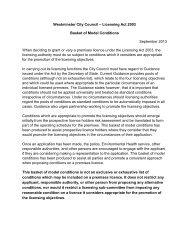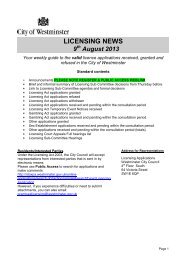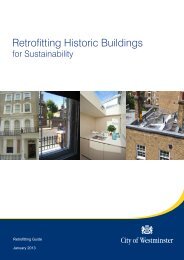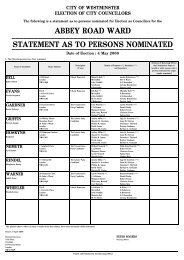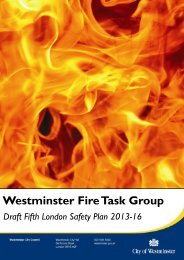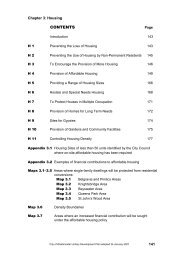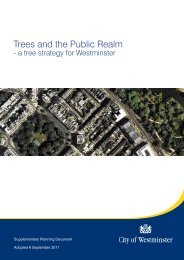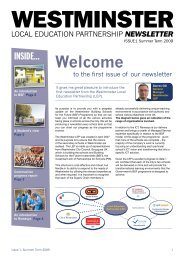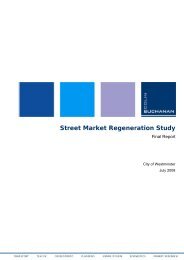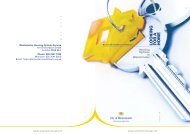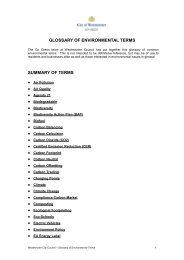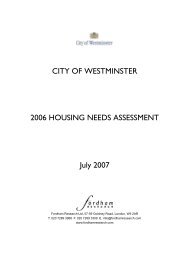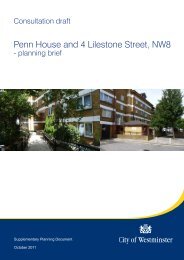Amended guidance issued under section 182 of the Licensing Act ...
Amended guidance issued under section 182 of the Licensing Act ...
Amended guidance issued under section 182 of the Licensing Act ...
Create successful ePaper yourself
Turn your PDF publications into a flip-book with our unique Google optimized e-Paper software.
PEOPLE WITH DISABILITIES10.24 It is important that appropriate steps are taken to ensure legislative requirements inrespect <strong>of</strong> health and safety are fully met, including in respect <strong>of</strong> all disabled people(including staff and performers). However, licensing authorities and o<strong>the</strong>r responsibleauthorities should avoid imposing inappropriate conditions which may actively deteroperators from admitting or employing disabled people.10.25 It is a legal requirement that facilities for disabled people at large (including staff andperformers) should be provided at places <strong>of</strong> entertainment. Duties imposed by <strong>the</strong> Equality<strong>Act</strong> 2010 provide that any person providing a service to <strong>the</strong> public must comply with <strong>the</strong>duty to make reasonable adjustments to enable disabled people to access <strong>the</strong> service,where a disabled person would be at a substantial disadvantage compared to a nondisabledperson 5 . This applies in regard to disabled people employed by or those whowish to obtain goods and services from licensed premises. No condition should <strong>the</strong>reforebe attached to a licence or certificate which conflicts with or duplicates this requirement.Service providers also have a duty to make reasonable adjustments to any physical featureswhich put a disabled person at a substantial disadvantage in accessing a service, or <strong>the</strong>yhave to provide <strong>the</strong> service by a reasonable alternative means. Access to buildings and<strong>the</strong>ir facilities is also a matter addressed in Building Regulations and planned alterationsaffecting access may involve <strong>the</strong> need to apply for building control approval.10.26 The reasonable adjustments duty becomes applicable, if reasonable in all <strong>the</strong>circumstances <strong>of</strong> a particular case, where:• a “provision, criterion or practice” <strong>of</strong> <strong>the</strong> person on whom <strong>the</strong> duty falls, places a disabledperson at a substantial disadvantage. An example <strong>of</strong> a reasonable adjustment might bea restaurant with a no-dogs policy ‘waiving’ it in respect <strong>of</strong> a disabled person’s assistancedog. For example, a guide or hearing dog. Any condition <strong>of</strong> a licence or certificate whichstates that “pets” may not be present on licensed premises for public safety reasons mustinclude a clear indication that <strong>the</strong> condition does not apply to guide or assistance dogs.Fur<strong>the</strong>r advice can be obtained from <strong>the</strong> Equality and Human Rights Commission (EHRC)website at www.equalityhumanrights.com.• a physical feature puts a disabled person at a substantial disadvantage compared with anon-disabled person.• it is appropriate to provide an auxiliary aid to help <strong>the</strong> disabled person overcome asubstantial disadvantage compared to a non-disabled person. For example, installing ahearing induction loop at <strong>the</strong> counter in an <strong>of</strong>f-licence to assist a disabled person with ahearing impairment.5 The accepted meaning <strong>of</strong> <strong>the</strong> term ‘substantial disadvantage’, for <strong>the</strong> purposes <strong>of</strong> <strong>the</strong> Equality <strong>Act</strong> 2010, is a disadvantage that is more than‘minor or trivial’.AMENDED GUIDANCE ISSUED UNDER SECTION <strong>182</strong> OF THE LICENSING ACT 200379



